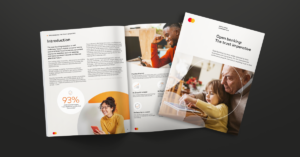PSD3 is an evolution of the existing European Payment Services Directive (PSD2) that introduced an array of reforms to increase competition and simplify payments across the European Union. While PSD2 is largely focused on leveling the playing fields for payments, PSD3 is also committed to better data access, improving consumer rights, fraud prevention and more.
In a recent interview with Fintech Magazine, Bart Willaert, EVP Open Banking, International Markets at Mastercard, sat down with journalist Louis Thompsett to talk about PSD3, the future of open banking and how leveraging open data takes open banking to a whole new level.
Let’s deep dive into some of the key questions around this topic to get a better understanding of this regulation.
How will PSD3 further streamline open banking? What further regulatory augmentations will this provide?
“Mastercard welcomes the PSD3 legislation proposed by the European Commission in June 2023, which confirms Europe’s global leadership in payments innovation and regulation.
While there are tremendous opportunities in terms of a framework, we need innovators to create the new products and services and we also need consumer trust in the safety, security and value of this new technology in order to help fuel it,” Bart Willaert says.

A recent Mastercard open banking whitepaper further explains that “While PSD3 still begins with the word “payment,” one of its objectives is to “improve the competitiveness of open banking services.” The approach makes sense when the business models for open banking sit mostly within payments and other transactions. Three times as many consumers worldwide picked making a payment over receiving personalized financial insights as a beneficial use case of open banking in the Mastercard 2022 New Payments Index.
More recently, open banking is moving into open finance. The EU’s proposed Financial Data Access (FIDA) regulation specifically goes beyond the payments account data of open banking to “establish a framework governing access to and use of customer data in finance.” Just as importantly, it notes the need for financial institutions across the EU to be “governed by the same legal framework and the same technical standards”.
Read Bart’s full interview in Fintech Magazine.
How will leveraging open data take open banking to a whole new level of interconnected digital services for consumers?
“Open banking is still in early days despite its recent growth in Europe and the U.S. and there’s a strong drive from the players and regulators in the ecosystem to make it more secure and robust.
While many use cases are available, it will take time for the benefits to be more widely understood. Additionally, people should expect to see many more use cases popping up in the existing datasets, but also with new datasets as regulators are thinking about broadening the scope.
Overall, we’re moving away from just open banking to open finance and smart data. The end goal is to empower both consumers and businesses to benefit from their financial data.”
Learn more about the future of Open Banking.
Walk us through the importance of digital ecosystems and how partnerships and third-party data sharing can foster new levels of customer engagement?
“With the digital ecosystem evolving every day, partnerships and third-party data sharing both play an instrumental role when it comes to fostering new levels of customer engagement in both banking and financial services. At Mastercard, we are focused on continuing to make strategic partnerships that are aimed at bringing the benefits of open banking to both consumers and businesses.

Recently, we’ve partnered with Nexi, the leading PayTech in Europe to secure seamless payment experiences that provide more choice for consumers when shopping online. Through the partnership, merchants will now be able to better align with heightened customer expectations for fast and frictionless payment experiences in the digital landscape by leveraging both Mastercard and Nexi’s innovative technology and payment methods.”
To read the full article, head over to Fintech Magazine. And follow Mastercard Open Banking on LinkedIn for updates and open banking news from around the world.




